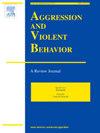Longitudinal associations between peer victimisation subtypes and children and adolescents' anxiety: A meta-analysis
IF 3.4
2区 心理学
Q1 CRIMINOLOGY & PENOLOGY
引用次数: 0
Abstract
This meta-analysis examined the bidirectional effects between types of peer victimisation and anxiety. It also investigated types of anxiety as a potential moderator of this relationship, which has not been examined within a meta-analytic framework previously. Five electronic databases were searched and longitudinal studies exclusively utilising published and validated measures for peer victimisation subtypes and anxiety symptomology were included. A total of 3760 articles were screened and 14 studies with a total of 11,307 participants met inclusion criteria. Results showed significant bidirectional effects between anxiety and several subtypes of victimisations including cyber, overt, relational, and reputational victimisation. Although significant effects were seen among all associations, these were all deemed as small, except for relational peer victimisation predicting anxiety over time which was considered to be a moderate effect size. Moderator analysis of anxiety types suggested that relational peer victimisation predicted social anxiety to a greater and more significant extent than general symptoms of anxiety. It was also found that general anxiety symptoms were significantly greater at predicting overt peer victimisation over time than social anxiety symptoms. These results hold implications for theories around the development and maintenance of anxiety, as well as providing evidence to inform treatments and interventions for both anxiety disorders and programmes aimed to prevent peer victimisation.
同伴伤害亚型与儿童和青少年焦虑之间的纵向联系:荟萃分析
本荟萃分析研究了同伴受害类型与焦虑之间的双向影响。它还研究了作为这种关系潜在调节因素的焦虑类型,而这种调节因素以前从未在荟萃分析框架内进行过研究。研究人员检索了五个电子数据库,并纳入了完全采用已发表且经过验证的同伴伤害亚型和焦虑症状测量方法进行的纵向研究。共筛选出 3760 篇文章,符合纳入标准的有 14 项研究,共有 11307 名参与者。研究结果显示,焦虑与多种受害亚型(包括网络受害、公开受害、关系受害和名誉受害)之间存在明显的双向影响。尽管在所有关联中都发现了明显的效应,但这些效应都被认为是小的,只有关系性同伴受害会随着时间的推移预测焦虑,这被认为是中等程度的效应。对焦虑类型的调节分析表明,与一般焦虑症状相比,同伴关系伤害对社交焦虑的预测作用更大、更明显。此外,研究还发现,一般焦虑症状对公开的同伴伤害的预测作用明显大于社交焦虑症状。这些结果对有关焦虑的发展和维持的理论具有重要意义,同时也为焦虑症的治疗和干预以及旨在预防同伴伤害的计划提供了证据。
本文章由计算机程序翻译,如有差异,请以英文原文为准。
求助全文
约1分钟内获得全文
求助全文
来源期刊

Aggression and Violent Behavior
Multiple-
CiteScore
7.50
自引率
4.30%
发文量
63
期刊介绍:
Aggression and Violent Behavior, A Review Journal is a multidisciplinary journal that publishes substantive and integrative reviews, as well as summary reports of innovative ongoing clinical research programs on a wide range of topics germane to the field of aggression and violent behavior. Papers encompass a large variety of issues, populations, and domains, including homicide (serial, spree, and mass murder: sexual homicide), sexual deviance and assault (rape, serial rape, child molestation, paraphilias), child and youth violence (firesetting, gang violence, juvenile sexual offending), family violence (child physical and sexual abuse, child neglect, incest, spouse and elder abuse), genetic predispositions, and the physiological basis of aggression.
 求助内容:
求助内容: 应助结果提醒方式:
应助结果提醒方式:


